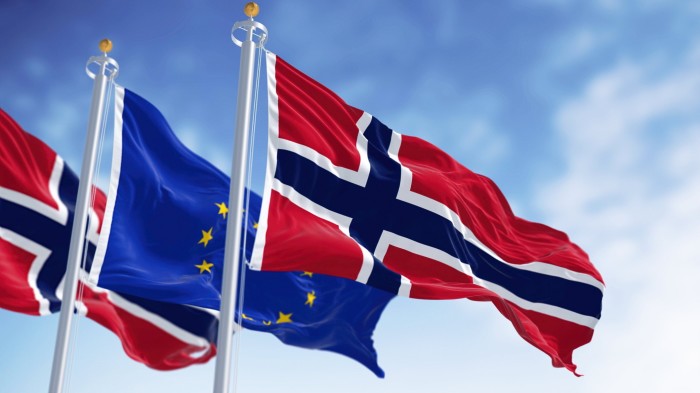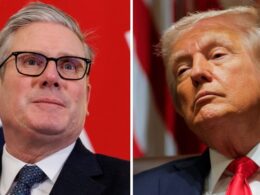Good morning. The political future of French far-right leader Marine Le Pen could be decided today, with a court set to rule on whether she committed fraud and embezzled EU funds — and if she could be banned from running for president in 2027.
Today, our Nordic correspondent reports on Norway’s new tilt at possible EU membership, and our Dublin correspondent explains why Trump’s tariffs terrify Ireland.
Third time lucky?
Norway is edging towards a new EU membership bid, as one of Europe’s richest countries ponders how to survive in the world of Donald Trump, writes Richard Milne.
Context: Western Europe’s biggest oil and gas producer has twice rejected joining the EU in referendums in 1972 and 1994, but has access to the bloc’s single market through membership of the European Economic Area and is part of the Schengen border-free zone.
Norway’s opposition leader Erna Solberg, who could return as prime minister at the head of the Conservatives in September’s elections, told the Financial Times that she wanted “a say at the table”, rather than the current situation of adopting most EU rules without any input.
“We are by definition in favour of EU membership. If there comes a window to apply, we will apply. I believe that Norway would be a better country if we were a member of the EU”, Solberg said.
Her party is even keener than her. Solberg wanted to wait until a clear majority of the population is in favour; the most recent opinion poll gives a small lead of 43 to 37 per cent to those against joining. But the Conservatives last weekend voted for having quick negotiations to join “should the situation warrant it”.
Many think the new US president could provide the necessary shock, with his repeated interest in Greenland adding to concerns about possible foreign interest in Norway’s northern outpost Svalbard — most likely from Russia.
Solberg however also said that a fresh EU debate could distract Norway from responding to the current security situation. “We know what will happen very well if we start discussing the EU question: we end up in the trenches”, she said.
There are other obstacles on the horizon. One is that Solberg’s probable coalition partners, the populist Progress party, are dead against EU membership.
Another is that former Nato secretary-general Jens Stoltenberg has returned to politics, and could help prevent the right from retaking power. His Labour party is in favour of EU membership, but not immediately.
But as neighbouring Sweden and Finland found with their recent Nato bids, things could change dramatically under an external shock.
Chart du jour: Rising tide
Germany’s defence spending spree is intensifying debt pressure on other Eurozone countries, and could scupper their own attempts to invest in their militaries.
Vulnerable
Donald Trump says Ireland was “smart” to attract US pharmaceutical companies and book their huge corporation taxes. But as the US president prepares to unveil his full tariff plans this week, he has vowed to bring them back to the US, writes Jude Webber.
Context: Ireland is the world’s third-largest pharmaceuticals exporter, producing 12 of the world’s top-selling medicines. The sector is worried it will be in the line of fire as Trump is set to unveil his largest round of tariffs on Wednesday.
Dan O’Brien, chief economist at Dublin-based think-tank IIEA, says Trump’s “liberation day” could hit Ireland harder in the long run than its 2010 bailout following the debt crisis. Irish finance minister Paschal Donohoe said the US measures spelled “a complex and significant challenge”.
Regulatory approval for new factories however means pharma companies cannot simply “lift and shift” stateside. Gerard Creaner, president of the career training provider GetReskilled, says Ireland’s 77,500 life sciences jobs “are safe from Trump’s tariffs for 10 years”.
But economists highlight a bigger fear: Trump could lure back investment by undoing some of the tax changes he himself introduced in 2017, and which inadvertently caused Irish pharma exports to the US to soar.
Big drug companies often create patents in the US and generate most of their sales there, but locate intellectual property rights, production and profits in Ireland to lower domestic tax obligations. Howard Lutnick, US commerce secretary, has called Ireland his “favourite tax scam”, and corporation taxes have driven record Irish budget surpluses.
“If Trump really wants to bring back corporation tax, undoing the tax reforms of 2017 is the most effective and precise way,” said Kieran McQuinn, Irish Taoiseach Micheál Martin’s economic adviser.
Up to half of pharma exports are “purely accounting based”, Aidan Regan, a professor at University College Dublin, estimates. “I do think the game is up for Ireland.”
What to watch today
-
EU chief diplomat Kaja Kallas attends Weimar+ meeting with representatives of France, Germany, Poland, Italy, Spain and the UK in Madrid.
-
European parliament plenary session begins in Strasbourg.
Now read these
Are you enjoying Europe Express? Sign up here to have it delivered straight to your inbox every workday at 7am CET and on Saturdays at noon CET. Do tell us what you think, we love to hear from you: europe.express@ft.com. Keep up with the latest European stories @FT Europe









